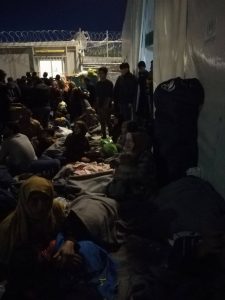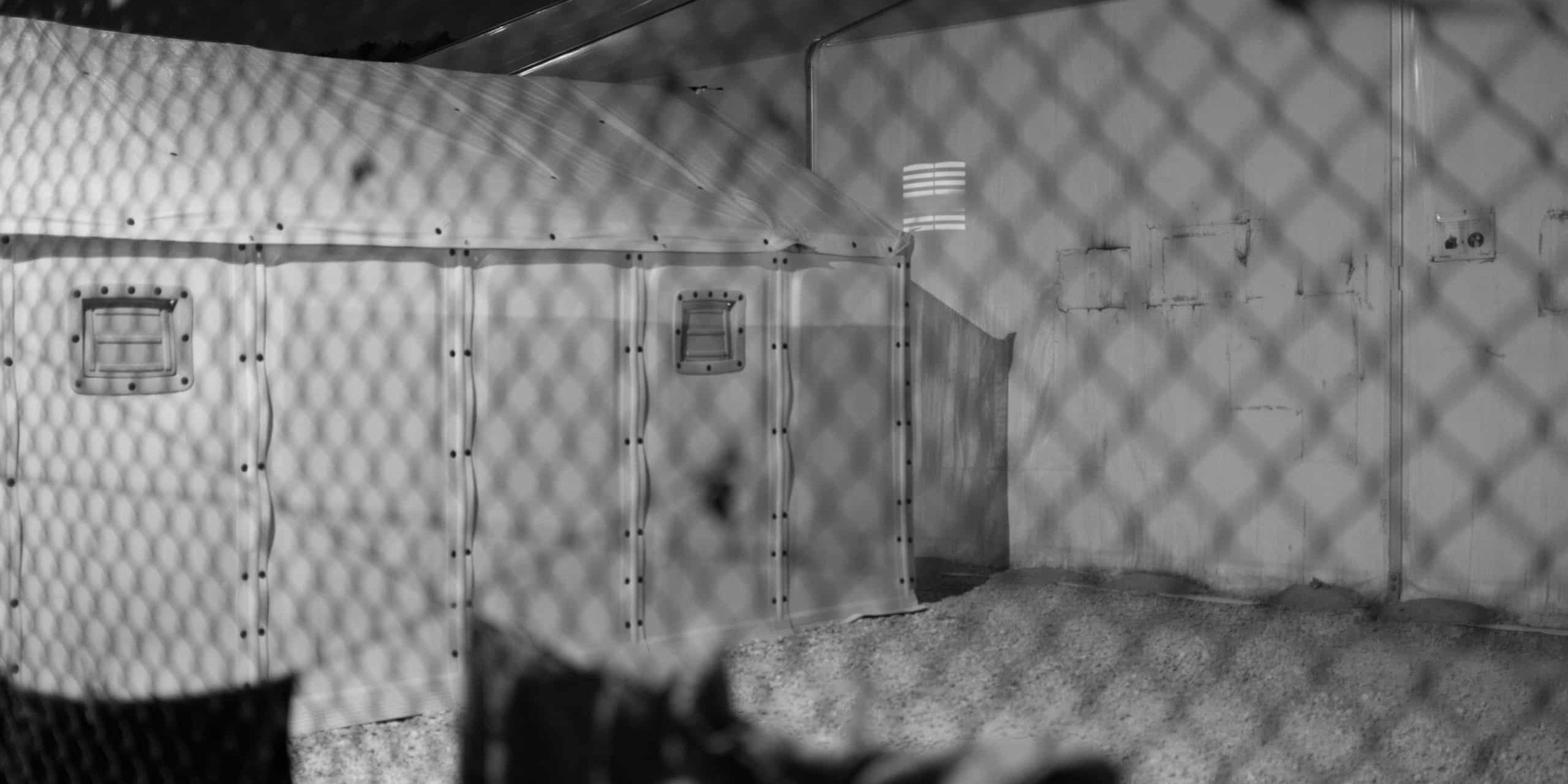Where EU migration policies fail to protect human rights, Philippa and Eric Kempson are there to defend them. The British artists have been living on the Greek island of Lesvos for almost 20 years now. They have witnessed how the island has turned from paradise to a place of horror. Even though winter is coming, refugees in the overcrowded HotSpot Moria have to sleep in makeshift tents. To help refugees in need, Eric and Philippa have founded “The Hope Project“, but the idleness of big aid agencies leaves them furious.
Philippa, in your latest Facebook Post, you write about the situation in camp Moria: “I’m standing watching a slow train crash”. What is most needed on Lesvos right now?
Philippa: There is a lack of everything. But the biggest problem is accommodation. When Moria was built, it was built for 750 people. Then the capacities were extended to almost 2,000 people. Official numbers for Lesvos in total are 8,106 people now. September, October and half of November have always been the busiest months. During last winter, a lot of people from Africa came. But this has changed dramatically: now 90 percent of the people coming are Syrians. They have been sitting in Turkey, waiting for legal ways to reunite with their kids in Germany, see their families. And then they realized that they have been lied to. The EU-Turkey-Deal says: if you come illegally you have no chance to get relocated legally. But now they know that actually nobody is being moved legally – so they are taking the boats again.
 Winter is coming: Last year refugees froze to death in tents in Lesvos. What do people have to expect this winter? Did the public authorities learn from their mistakes?
Winter is coming: Last year refugees froze to death in tents in Lesvos. What do people have to expect this winter? Did the public authorities learn from their mistakes?
Philippa: It’s going to be worse than last year. UNHCR says it‘s not their responsibility to prepare the camps for winter, it is the Greek authorities‘. This time last year, the population on the island was about 3,000 – it went up to 6,000 by January. Now is the busy time of arrivals and we already have more than 7,000 people living here. Just yesterday we had 4 boat landings. In this picture you see the arrivals area outside Moria, people are waiting outside because the inside is full. Keep in mind that it rained also!
In the beginning of October, a large collective of civil organizations including Sea-Watch has urged the Greek government to „open the islands“: That means shutting down the HotSpots and resettling people to the mainland. Is there any reaction by the authorities?
Philippa: It‘s a real mess, they have moved around 350 people lately – but we had more than that arrive in three days. After people died last January, the UNHCR and the Greek officials panicked and half of the refugees got moved. This seems to be the only plan again, the camps are not being improved. And in Moria camp we still see refugees without blankets, sleeping on the floor without any protection.
Eric: Basically, they had a meeting on winterization in January, when people were already dying. And now the UNHCR are saying they are not involved in this issue. They are meant to protect refugees: How can they say they are not involved in the winterization? They take the donations and the money from the government and all they do is bossing around, pretending to be important – that’s what I have seen in three years.
What would improve the situation of the refugees landing there now?
Eric: What could really improve the situation would be that the aid agencies actually started working and using the money they have instead of spending it on their own. There is one positive example, a house run by refugees with the support of the NGO „One happy familiy“. They have a house, a library, a school, they built a gym for work-outs. They work with a big heart, without money. And then there are aid agencies which receive huge funds from Europe and it all disappears. Why can‘t they do at least something like this? I see refugees suffering, because they don’t provide any clothes in Moria.
What do you mean, the UNHCR does not provide people with basic needs?
Eric: I have so many stories to tell: Last winter, we had people in FlipFlops and shorts. One guy had a pink pair of tights, trying to keep warm. And then you speak to Red Cross or UNHCR and they say: „They don’t want clothes“. And you think: How is it they don’t want clothes? It‘s minus 5 degrees, it is freezing cold. And when I offer them clothes, they come snatch it out of my hands. What’s the reality?
Philippa: One women who arrived in July lost her shoes on the way. She got to Moria, where the paths are full of gravel stone. So she goes to the ‚Eurorelief‘ facility and says that she has no shoes. And they give her a piece of paper saying her clothing appointment is on the 19th of August – and that she should bring her medical papers. Why do you have to show your medical papers to get a pair of shoes? This is supposed to be an aid organisation. Why do they want access to your personal data to provide clothes?
Eric: We got a pair of shoes for her. But this is not the point. In winter, people had to wait for one month to get a blanket. The actions of UNHCR and Red Cross are deliberate actions. They are abusing refugees deliberately to stop others coming by boat.
Philippa: These are criminals. And no one is investigating. No one uncovers their criminality. I mean: Who is following the money Europe spends on the so-called refugee crisis?
[arve url=”https://www.youtube.com/watch?v=_WbGxvquzV4″ title=”#MonitoringMoria Sanitation” /]
video sent by a detainee from inside camp Moria
Since the EU-Turkey-Deal was put into place, journalists and NGOs have only had limited access to the Hotspots. What do the authorities have to hide in those camps?
Eric: They can’t hide anything because the refugees are sending us pictures. The sanitary facilities look horrible – there are regular water shortages in the camps. No hygiene. They sent us videos of people hanging themselves. There was a guy trying to commit suicide for four times in the camp – the fifth time he succeeded. You have all these aid agencies in the camp and not one of them was alerted on the first time he tried to hang himself. After the first time they should have provided him mental help or put him to another place, maybe to a hospital.
What is their staff doing, sitting around drinking coffee and Ouzo? They don’t care how the refugees are doing in the camp and every time someone asks for help they are telling them „Go away.“
Philippa: The only psychologists on the island are from Doctors Without Borders (MSF) and they are not accepting any new patients because they are already overwhelmed with the cases they have. In January, the Greek minister of immigration went on TV and said: „Nobody is living in tents“. It was true. At that point, people didn’t even have tents: They slept outside on the floor.
Interview: Theresa Leisgang & Marlene Resch
Further information
You will find “The Hope Project” on Facebook if you want to stay up to date with developments on Lesvos. In our video, you see the Kempsons at work: Follow them on a tour through their house in the North of the island: https://www.youtube.com/watch?v=WTDipMVlLJk
In our Sea-Watchblog #MonitoringMoria, we have collected the greatest ills of camp Moria. Shortcomings range from a lack of sanitation to repression of those who want to claim their rights to adequate housing:
Follow us on Twitter:
#MonitoringDirtyDeals
#opentheislands












